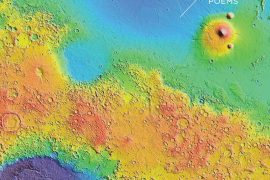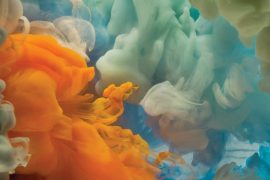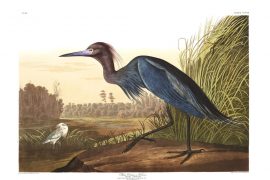It’s sometimes true that poets who write with more abstraction, or at least with a greater theoretical bent, get charged with solipsism; we’re not quite accustomed to the idea that a poet might be drawn to the theoretical for it’s own sake, precisely because it delights them. Fortunately, Kimberly Quiogue Andrew’s collection Between is both theoretical and delightful.
Between is conceptual in the same way a formal work of theory might be, but while theory relies on the plain meaning of words and phrases, Between is attentive to (and energized by) the intrinsic volatility and liminality of language. Like all poetry, it depicts, enacts, and envisions, but the more I read it, the more I felt that there was a specific theme underlying this collection. Each impression is quickly replaced by something else–a new image, a new moment of reflection, itself lasting no longer than a line or two. It’s as if these quick turns of thought are designed to destabilize the very process of thinking. Andrews is also a professor and literary critic, and I imagine that there’s always analytic questions lingering in the back of her mind, even as she writes creatively. In “Four-four, or, it’s possible we make music because we are herd animals,” not even the most ordinary objects are permitted to retain their traditional meanings.

The speaker “courses down the pavement” and never lands anywhere, a movement which creates a sense of transiency that underpins each poem’s embrace of perceptual suspension.
In many ways, betweenness is the anti-binary, not because it is necessarily more holistic, or because it gestures towards something entirely different. Betweenness defies the binary because it combines the opposing forces or characteristics pulling at the poles, participating in the either and the or simultaneously. One task of categorization is to forcibly uphold the boundary between allegedly distinct qualities; we are therefore left with a strange difference, an unclaimed middle zone which can feel like a void. It can be a void in knowledge, emotion, identity, or desire. But this vacuous place is also home to things like tension, promise, and possibility. It’s this zone of indeterminacy that we often call the in-between. Andrews composes precisely from this space.
Situating oneself inside betweenness allows the mind to live in a state of ideological defection: if a thing is not what it is alleged to be, then it can become anything it wants. Of course I thought of Ashbery many times while reading Andrew’s poetry. Like Ashbery’s lines, Between demonstrates a deep embrace of free association and conceptual play, so much so that we become uncertain of meaning altogether and perhaps even suspicious of our desire for it in the first place. One important virtue of poetry, I think, is that it frees us from our old convictions and attachments: words and phrases are arranged in ways that produce new perceptions, new feelings, or new considerations of social and psychological phenomena we previously accepted as immutable truth. But for Andrews and Ashbery, even this limits what poetry can do. Aren’t new truths at risk of becoming ossified too?
It’s as though this question haunts every line of Andrew’s restless yet forward moving poems. Her writing is jarringly beautiful even in its state of semantic panic. There’s a randomness to the word imagery, a haphazardness, a poetic subject prone to wandering but also keen to observe reality and explore it. In “Favour: cleaning out the garbage,” the speaker surveys her environment without seeming to find any meaning or coherence within it:

There is no plot, there is no pull beyond the reader’s own curiosity to keep reading on. Yet somehow, these poems manage to tell an accurate story of our cluttered, disorientating lives under capitalist culture. I often wondered: is Andrews creating perceptual chaos or astutely appraising all the chaotic aspects of the materialism that characterizes our everyday environments? To what extent have objects (the tool, the book, the branded item) become naturalized and necessary parts of our experience? How did the foreign become too familiar to even take note of?
The linguistic ingenuity of Between creates a palatable emotional atmosphere in which the speaker seems confident but world-weary; agile at times, occasionally depressed, jubilant, indifferent, curious, appraising. These states are shifting cycles that refuse to be tethered to any kind of permanency. But this is the gift of betweenness; it invites us to pause, contemplatively inhabiting each moment for the purpose of seeing things in an unexpected way. While this might leave us uncertain about our next move or thought, it promises something new beyond where we are. Between reminds us that, in the case of much good writing, it’s uncertainty that drives the creative process, a process which ideally works to recreate us. And it’s poets like Andrews and Ashbery who remind us that poetry can free us from the truth imperative entirely.





